The collection as a text-forming mechanism: A case study of a playful bachelor song
DOI:
https://doi.org/10.21638/spbu09.2020.308Abstract
Based on the example of the Old Polish song “Pannom świat, / A mężatkom niebo, / A wdowusiom raj, raj, raj, / A babkom piekło” (En. lit. ‘For maidens the world / For married women heaven, / And for widows paradise, paradise, paradise / And for crones hell’) and its many variants in Polish song folklore, the author discusses the text-forming mechanism of the basic collection: maiden — married woman — widow — crone, which is the starting point to introduce some coupled, or mirrored collections of the type: heaven — paradise — purgatory — hell. The concepts of collection and complex are applied here as useful analytical tools which allow for identification of culturally stable stereotypical sets, and for labelling them with the use of superordinate lexemes, e.g. VEHICLES: coach-in-four — royal coach — stagecoach — wheelbarrow; DRINKS: wine — beer — weak, home-brewed beer — water, etc. The analysis of a multi-variant song, performed in the present study, leads to the conclusion that Albert Lord’s oral-formulaic theory of atext of folklore needs to be extended by introducing a more general idea of the “textual pattern” active on the level of individual text elements, as well as on the level of an entire text. In the case discussed in the present paper, the factor that integrates the whole message is constituted by a mocking intention assigned to the male (“bachelor’s”) point of view.
Keywords:
Polish song folklore, collection, textual pattern, text-forming mechanism, male (bachelor’s) point of view
Downloads
References
Bartmiński 1975 — Bartmiński J. Wokół Lordowskiej koncepcji formuły. Literatura Ludowa. 1975, 6: 3–11.
Bartmiński 1990 — Bartmiński J. Kolekcja w strukturze tematycznej tekstu ustnego. In: Tekst w kontekście. Zbiór studiów, red. Teresa Dobrzyńska. Wrocław: Zakład Narodowy im. Ossolińskich, 1990. P. 155–174.
Borowicz, Hobot, Przybylska 2010 — Borowicz S., Hobot J., Przybylska R. Stara rebeliantka. Studia nad semantyką obrazu. Kraków: Wydawnitcwo Uniwersytetu Jagellonskogo, 2010. 384 p.
Lewicki, Pajdzińska 2001 — Lewicki A., Pajdzińska A. Typologia związków frazeologicznych. Źródła fraze ologizmów. In: J.Bartmiński (ed.). Współczesny język polski. Lublin, 2001. P. 315–333.
Mokienko 1980 — Mokienko V.M. Slavic phraseology. Moscow: Vysshaia shkola Publ., 1980. 207 p. (In Russian)
Niebrzegowska-Bartmińska — Niebrzegowska-Bartmińska S. Wzorce tekstów ustnych w perspektywie etno lingwistycznej. Lublin: Wydawn. Uniw. Marie Curie-Skłodowskiej, 2007. 452 p.
Lord 1960 — Lord A.B. The singer of tales. Cambridge (MA): Harvard University Press, 1960. 500 p.
Parry 1987 — Parry M., Parry A. (eds.). The Making of Homeric Verse. The Collected Papers of Milman Parry. New York, Oxford: Oxford University Press, 1987. 483 p.
Peuckert 1961 — Peuckert N. Die Funktion der Formel im Volkslied. In: Poetyka. Materials of the I Interna
Downloads
Published
How to Cite
Issue
Section
License
Articles of "Vestnik of Saint Petersburg University. Language and Literature" are open access distributed under the terms of the License Agreement with Saint Petersburg State University, which permits to the authors unrestricted distribution and self-archiving free of charge.






